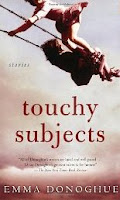As a writer whose first short story collection is being published next year it's hard to admit that National Short Story Week passed me by. I knew it was happening. I didn't attend any events in my neighbourhood (tiny village surrounded by roadworks and unfortunate Palladian villas on hills), mainly because there weren't any. I didn't even read up much, reply to anything, or even finish my own damn revisions (I did make the executive decision to remove two stories. Or maybe not. Or maybe.)
But I've been reading. This year I have read quite a few short story collections, more than I can write about here. The most recent have had me really thinking about what constitutes a great short story - as a reader - and trying (desperately!) to relate that to my own work. I finally concluded early one morning as the 5.50am alarm went off that the last line of a short story is like a gate being clicked shut, or a lock being snapped closed, or the final piece of a jigsaw being eased into place. It must be a moment of completion, of being locked within the story like a tight embrace.
Nothing new here, but it felt clarifying. I was just as thrilled when I read about Hemingway's iceberg theory - where 80% of the 'story' lies suggested beneath the surface. And now I have this warming nugget to add to my writerly thoughts.
I'll start with the short story collection I am reading now, Irish Emma Donoghue's 'Touchy Subjects'. A lot of people say they don't particularly like short stories because as soon as you are absorbed, the action is over, the climax is behind your back, or shivering in your hands. Emma's stories are swift, almost casual, and difficult to put down. Each time I can feel that last jigsaw piece falling into place and I look forward to that resolution, the end of that compact journey. And yet her characters are no more compelling than you or I. A personnel officer places his chic coat over a homeless man, while ridden with moral fastidious doubts. A lesbian couple split up over a vet's bill. A man can't decide what colour to paint his house. And one of my favourites, a young guy struggles to tell his girlfriend about the hair on her chin. So artful. So cheeky.
Before that I read 'Dark Roots' by Australian author Cate Kennedy. What a mistress of the story! Cate's story 'Cold Snap' was in The New Yorker and it's easy to see why. A 'simple' country boy is treated as such by a city woman who has bought a house nearby, whose arrogance has her eliminate the old gum trees obstructing her lake view. The 'simple' narrator deals with this in a chilling way. Another favourite is the first story 'What Thou and I Did, Till We Loved'. It's almost too beautiful to explain but the essence of this and many of Cate's pieces is that outer action follows inner contemplation or compulsion. She rides that motion with scant language, speaking of relationships that change gears and the tight weave of domesticity. Strongly recommended.
Laura Maylene Walter is an American writer whose collection 'Living Arrangements' won the G.S. Sharat Chandra Prize for Short Fiction. I 'met' Laura through a loose group of American writer/bloggers who I join when I can, and I've been reading her blog for ages (I will be interviewing Laura in the near future!). I knew from the tone of Laura's blog voice that I would enjoy her book and what a rewarding, thoughtful read, with many of her stories still making eddies in my head. Laura addresses loss and place, quirky women, beauty and survival, the dance between women and men, sometimes with a hint of danger. Her characters are often numb, pulling away from their pasts or their place in society. I liked the contrast, the stillness and the lack of fear in Laura's voice. Brilliant.
I read Sarah Hall's 'The Beautiful Indifference' while on a lounger in Corsica this summer on breezy afternoons. It finished too quickly. Having received deserved recognition last year, I knew this book was a banner-waver for short story writers and it didn't disappoint for a second. I haven't read Hall's novels - already someone with such an output at her age makes me green all over - but I wouldn't want my admiration for her stories to be turned into something else. Her stories were long and fruitful, drenching, draining, beautiful. From her EFG Booktrust short-listed 'Vuotjarvi' which takes place on the shores of a Finnish lake, to a lover's tiff gone super-bad in Maputo, involving - maybe - a leopard; Sarah delves deep into the sensual folds of coupledom, and cuts into British society. Her language is break-taking:'They had already rowed out..and gone in where the shadows were expansive, the bottom a black imagining.' If you buy this one, don't give it away.
Recently I read that the best stories are those that you might forget, but you remember. You remember the tones, the lilt of the language, the current of thought. These are all collections that I will be remembering.




